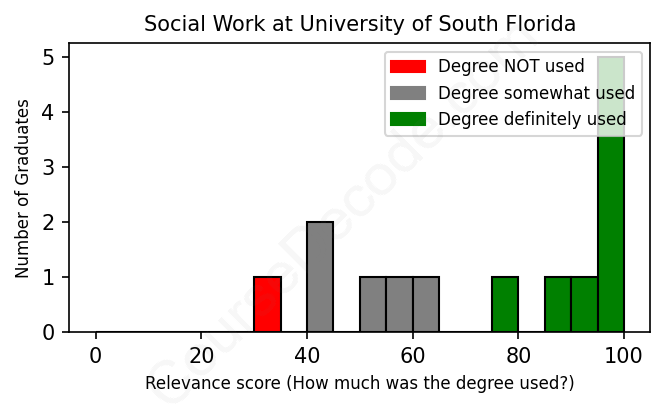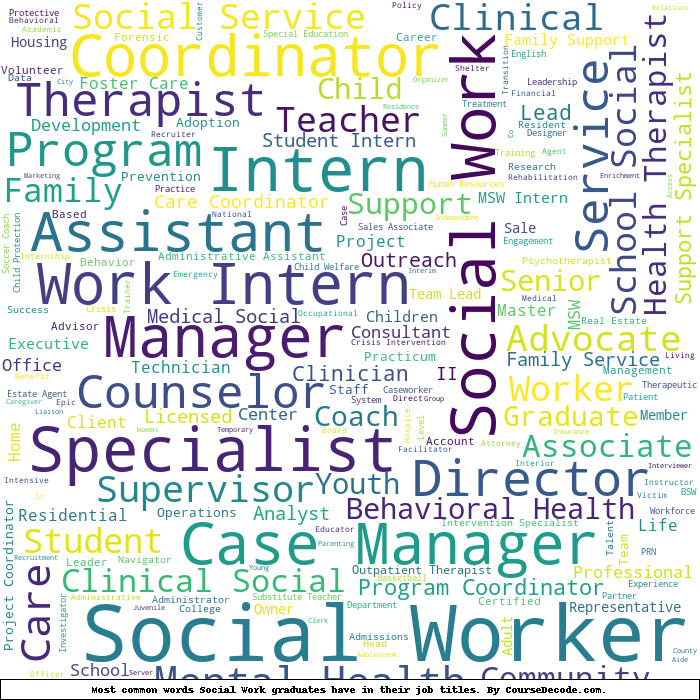
First, some facts. Of the Social Work graduates from University of South Florida we've analyzed , here's how many have used (or NOT used) their degree in their career:

These are estimates based on AI analysis of 14 LinkedIn profiles (see below).
The verdict? Above average. Overall, with an average relevance score of 74%, Social Work graduates from University of South Florida have a higher likelihood (+7%) of finding work in this field compared to the average graduate across all fields:
And for comparison, here's the chart for all profiles we've looked at across all degrees.
Also, after graduating, 50% of these graduates have pursued further education other than another Bachelor's degree (such as a Masters degree or other), compared to the average across all profiles of 35%. This suggests you may need more than just a Bachelors degree to be competitive as a Social Work graduate.
See the details:
|
Relevance score: 41% We think this person has gone into a career only somewhat relevant to their degree. We think this person has gone into a career only somewhat relevant to their degree.
DEGREE INFOGraduated in 2019 from University of South Florida with a Bachelor's degree in Social Work. No other secondary education since. JOB HISTORY SINCE GRADUATIONSocial Services Intern BayCare Health System Aug 2019 - Dec 2019 Optometrist Technician  Gulf Coast Optometry Jul 2020 - Aug 2021 Activities Coordinator  Humana Aug 2021 - Present ABOUTNo information provided. |
The top 10 most common jobs done by the graduates we've analyzed (ranked most common to least) are:
After looking at the job histories of people who graduated with a Social Work degree from the University of South Florida, it’s clear that many of them have pursued careers closely related to social work principles. A significant number of graduates have taken up positions like Social Workers, Case Managers, and various roles in healthcare settings (like Hospice Chaplains and Medical Social Workers), which all directly employ the skills and knowledge gained from their education. These positions generally involve a lot of direct client interaction, assessment, and advocacy, making them very relevant to social work.
On the flip side, there are also quite a few cases where graduates have ended up in jobs that aren’t directly tied to social work. Roles like Medical Receptionists or Customer Service Representatives, for example, may involve some interpersonal skills but don't truly utilize the core competencies that come with the degree. It seems that while many graduates have managed to find rewarding and relevant social work-related jobs, others have drifted into positions that aren’t as closely connected, showcasing a mixed outcome in job relevance for Social Work graduates from this university. Overall, it looks like there's a strong link between their degrees and many of their career choices, but not all paths taken have been directly related to social work practice.
Here is a visual representation of the most common words in job titles for Social Work graduates (this is across all Social Work graduates we've analyzed, not just those who went to University of South Florida):

Looking at the career trajectories of graduates from the University of South Florida's Social Work program, it seems there are a few common paths people take right after finishing their degree. Many start off in intern positions that relate directly to social work, such as internships at various health and community organizations. For instance, graduates from 2012 and 2014 began their careers as interns at supportive organizations, suggesting that entry-level roles in the social services sector are quite common. However, not everyone sticks strictly to social work; some early jobs were in unrelated sectors, like food service or teaching, which might indicate that some graduates didn’t find immediate work in their field or decided to explore different interests at the start of their careers.
As time goes on, particularly five or ten years down the line, a significant number of these graduates seem to have retraced their steps back to social work, landing solid positions such as social workers at hospitals, care coordinators, or therapists. For instance, many graduates eventually find themselves working in healthcare-related settings or as case managers, which are roles that directly utilize their social work training. While there are a few instances of graduates taking non-social work paths, particularly in the earlier years post-graduation, the trend among these alumni appears to be a return to core social work roles as they gain experience and focus on their careers. Overall, while not every graduate’s path is entirely smooth or strictly within social work from the get-go, many seem to wind up in related and fulfilling roles, which is a promising outlook for new social work graduates in the future.
Getting a Bachelor’s degree in Social Work (BSW) at the University of South Florida or really anywhere else isn’t a walk in the park, but it’s not the toughest degree out there either. You’ll dive into a mix of social science courses, learn about human behavior, and get a solid grounding in social justice issues, which can be super interesting but also requires a lot of reading and understanding complex materials. There’s also a fieldwork component, which is crucial for gaining real-world experience, and that can be both challenging and rewarding. Overall, it generally has a good balance of demanding coursework and engaging content, making it a solid choice if you're passionate about helping others!
Most commonly, in the LinkedIn profiles we've looked at, it takes people 2 years to finish a Bachelor degree in Social Work.
From what I can see, it looks like the social work grads from the University of South Florida are mostly sticking to their field, which can be noble but sometimes doesn’t lead to huge paychecks. The range of positions, from chaplains to case managers, often pays decent but not exactly top-dollar compared to other professions. For example, hospice and community-focused jobs might offer a comfortable living, but they're generally around average pay, especially early on in their careers. While some roles like "Therapist" or "Social Worker" may eventually lead to better salaries, a lot of the earlier positions, especially internships and entry-level jobs, tend to be a bit on the lower side. So, if you’re looking for some serious cash, social work might not be the goldmine you're hoping for, but it can definitely be fulfilling if you’re passionate about helping others!
Here is a visual representation of the most common words seen in the "about" section of LinkedIn profiles who have a Bachelor degree in Social Work (this is across all Social Work graduates we've analyzed, not just those who went to University of South Florida). This may or may not be useful:

Here are all colleges offering a Bachelor degree in Social Work (ordered by the average relevance score of their Social Work graduates, best to worst) where we have analyzed at least 10 of their graduates: